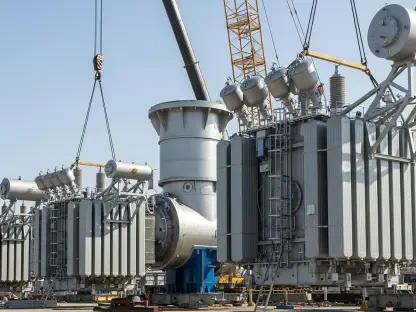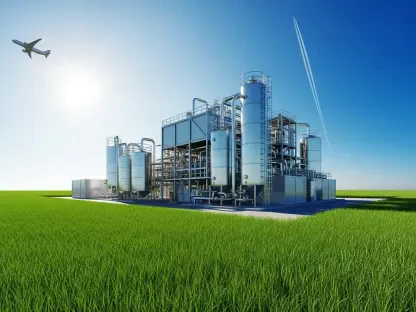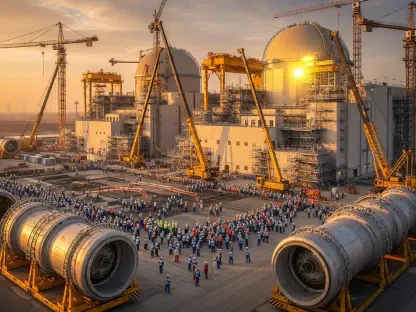In the heart of Central Asia, Kazakhstan stands at a critical juncture as geopolitical tensions and economic pressures collide, driven by the ongoing conflict between Russia and Ukraine, which has disrupted energy markets and trade. This oil-rich nation, responsible for roughly 2% of global oil supply, has made a bold move to extend its fuel price freeze until at least spring, a decision announced in Astana that reverberates with significance. The policy aims to shield citizens from skyrocketing costs amid regional instability, raising questions about how long such measures can hold against mounting external and internal challenges. This event marks a pivotal moment in Kazakhstan’s economic strategy, reflecting a delicate balance between domestic stability and international fallout.
Policy Announcement Shakes Economic Landscape
In a significant development in Astana, Economy Minister Serik Jumangarin declared the continuation of the fuel price freeze, a policy designed to curb the impact of soaring petroleum costs linked to the Russia-Ukraine conflict. Speaking at a press briefing, the minister underscored the urgency of maintaining price controls as a buffer against economic shocks rippling across borders. This decision, paired with recent utility tariff caps, signals the government’s commitment to protecting households from the burden of inflation and regional disruptions.
The announcement comes as Kazakhstan, a key player in the global energy market, navigates its deep economic ties with Russia, its primary trade partner. Minister Jumangarin explicitly tied the policy to the sharp rise in fuel prices in Russia, attributing the surge to the ongoing war’s destabilizing effects. He emphasized a cautious stance, noting that any reconsideration of the freeze would depend on stabilization in neighboring countries, painting a picture of a nation on guard against unpredictable external forces.
Geopolitical Undercurrents Drive Decision
Delving deeper into the rationale, the fuel price freeze emerges as a direct response to the geopolitical storm surrounding Kazakhstan. The conflict in Ukraine has not only strained relations but also disrupted energy markets, with Russia facing significant price hikes that inevitably spill over into Kazakhstan’s economy. This interconnectedness forces the government to prioritize price stability as a means of insulating its population from the fallout of a war far beyond its borders.
Economy Minister Jumangarin highlighted the need for a measured approach, suggesting that regional calm must precede any policy shift. Experts observing the situation note that Kazakhstan walks a tightrope, maintaining close ties with Moscow while expressing support for Ukraine’s territorial integrity. This diplomatic balancing act adds complexity to economic decisions, as the nation seeks to avoid alienating key partners while addressing urgent domestic needs.
Echoes of Past Unrest Inform Strategy
The shadow of history looms large over Kazakhstan’s current policy, with memories of the tragic January 2022 protests still fresh. Those events, sparked by a sudden spike in liquefied petroleum gas prices, escalated into deadly clashes, leaving hundreds dead and prompting intervention by regional peacekeeping forces. The government is keenly aware that fuel price volatility can ignite social unrest, making the extension of the freeze a preventive measure rooted in hard-learned lessons.
Today, with inflation running at 12.9%, the risk of public discontent remains high. Policymakers are driven by a resolve to avoid repeating past mistakes, ensuring that price controls act as a safeguard against potential upheaval. Analysts point out that this strategy reflects a broader recognition of fuel costs as a flashpoint for stability, especially in a climate of economic strain and uncertainty.
Domestic Struggles Underpin Protective Measures
On the home front, Kazakhstan grapples with mounting economic pressures that amplify the need for the fuel price freeze. Inflation continues to accelerate, eroding purchasing power, while the central bank’s drastic hike of interest rates to 18% signals the gravity of the financial challenges at hand. These conditions place immense strain on citizens, prompting the government to implement protective policies aimed at softening the blow of rising costs.
Beyond fuel, the simultaneous imposition of utility tariff caps illustrates a comprehensive effort to shield the population from price shocks across essential services. Public reaction to these measures varies, with some expressing relief at the temporary respite, while economic stakeholders caution about the long-term sustainability of such interventions. The tension between immediate relief and future fiscal health remains a central concern for all involved.
Regional Energy Shocks Add Urgency
Compounding the situation are specific energy disruptions in the region, notably the recent Ukrainian drone strike on Russia’s Orenburg gas plant, which processes gas from Kazakhstan’s Karachaganak field. This incident temporarily slashed capacity, sending ripples through the energy supply chain and heightening concerns about reliability. Such events underscore the fragility of the regional energy landscape and reinforce the necessity of price controls to maintain stability.
The strike serves as a stark reminder of how external conflicts can directly impact Kazakhstan’s economic environment, even when the nation is not a direct participant in the hostilities. Government officials view the fuel price freeze as a critical tool to mitigate these unpredictable shocks, ensuring that domestic markets do not bear the full brunt of regional turmoil. This aspect of the policy highlights its role as both an economic and strategic defense mechanism.
Reflecting on a Strategic Stand
Looking back, Kazakhstan’s decision to extend the fuel price freeze stood as a calculated response to a confluence of geopolitical strife and domestic economic woes. The event in Astana, marked by Economy Minister Serik Jumangarin’s resolute announcement, captured the nation’s determination to prioritize stability in the face of adversity. It reflected a nuanced understanding of historical triggers and current crises, positioning price controls as a linchpin of social and economic order.
Moving forward, the challenge lies in sustaining these measures without compromising long-term fiscal health, a concern that policymakers must address through innovative economic planning. Exploring diversified energy partnerships and bolstering domestic resilience could serve as vital next steps to reduce reliance on volatile regional dynamics. Additionally, fostering dialogue with both public and private sectors might help gauge the efficacy of such policies, paving the way for adaptive strategies that balance immediate relief with enduring stability in an ever-shifting global landscape.









